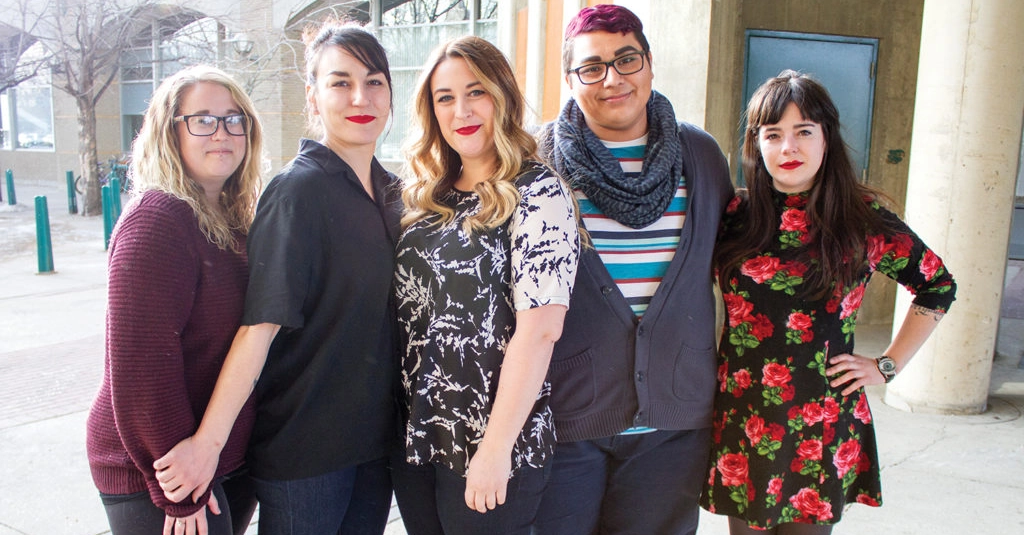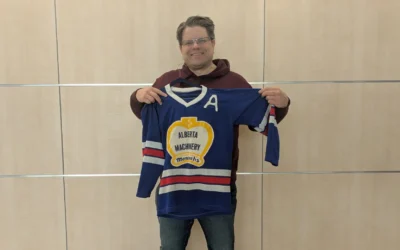Just to start with the easy question first: who are the Feminists at MacEwan?
Katie: Well, we’re a student-run organized club at MacEwan.
Kaitlyn: We’re not just, like, the executive team. We’re an intersectional feminist group.
Jason: I guess speaking on that, us and our members are very heavily invested in looking at feminism in a very broad scope. So, not just the one view of feminism, such as with white feminism, but trying to look at feminism in its various ways, because we understand and see that different people have different experiences and views of feminism. So, we’d like to be a big collective group that just kind of welcomes everyone and believes in gender equity. That’s the basis. It could include other things, like trans rights.
Kaitlyn: And addressing issues of race.
Jason: Right.
That ties in with one of the other questions I have about some of the criticisms that people could have, not just about the club, but about feminism in general. If someone, whether they are a member of the club or not, came to you and said, ‘I feel like feminism doesn’t include me,’ how would you address that?
Katie: I would do anything in our power to make the group more inclusive. We do stress inclusivity, for sure.
Kaitlyn: I’ve personally gotten that question before, in and outside of the group, and it’s definitely tricky, but you want constructive criticism. I always stress that feminism as a movement has not been, and is not, perfect, and the first, second, and third waves were definitely based around cisgender, white, middle-class women.
I think it’s our duty to kind of work through that misconception, because we are doing everything in our power to expand away from that, to be inclusive and include everybody.
Jason: Being critical of the movement itself, like Kaitlyn just said, and just being critical of ourselves and what we’re doing by having feedback given to us and taking in that feedback, and really thinking of certain topics that touch on different groups.
For instance, our event on missing and murdered indigenous women — we did that because we believe that is our duty, that it is a huge feminist issue that is definitely intersectional. It has various areas of feminist thought and feminist debate when it comes to race and ethnicity, colonialism, ethnic relations, geographical issues — all of these different things that we believe have room for feminism and can definitely be addressed. We do this to have a more foundational understanding of what feminism is, and specifically that feminism is not just a gendered issue, but a racialized political issue — one that has historical implications. We’re trying to demonstrate, for instance, with this one event, that we’re not just trying to be like the leaders of feminism before us. We’re really trying to push the limits and make other issues our issues, because they should be, especially when you’re talking about missing and murdered women, as an example.
On top of that event, what types of other activities does the club do?
Kaitlyn: We try to have a whole range of events. In the summer, we would have lecture-style events and a conversation about it after, and then we have panel events like this one. We’re just trying to have diversity.
Jason: There was one in February called Feminism and Chill. The U of A had this sort of event — just meeting up as feminists, watching something feminist from Netflix and eating ice cream, basically. Really, just kind of having fun with that. Otherwise, another event we have coming up (on March 29 at 4 p.m. in Room 7-227) is about feminist English contemporary literature, and there will be an event about feminist dating as well (on March 7 at 4 p.m. in Room 7-233).
Kaitlyn: Yeah, we’re going to try and do something about, like, being the best feminist partner you can, or dating in this new feminist climate. We’re seeing where we can go with that.
Is it like a discussion?
Kaitlyn: Yeah. Like, usually, us as executives, we decide on a topic, then maybe bring in some quotes, or a small PowerPoint, or a video or something like that, but it’s mostly to encourage discussion with everyone.
Jason: In terms of different issues too, last semester, we had this event that was like ‘We need feminism.’ A previous exec came in and talked about the issues with stereotypical masculinities, or what’s problematic about trying to uphold this kind of ideal masculinity that hurts men’s lives and health and relations, and all these other things. Gender and violence was another thing we discussed, and then body positivity. We really try and go into various aspects of feminism. We also had an event about celebrity feminism.
Katie: When you’re maybe targeting an audience of feminists that might be new to it, or people that don’t know anything about feminism, and then we have people who’ve been studying feminism and calling themselves feminists for years, it’s a broad range of people that we try to appeal to. So we have these pretty intense events, like the one about murdered indigenous women — that can be a very intense issue — and then we also do Feminism and Chill, and we did a Feminist Ted Talk last semester.
Kaitlyn: We always try and start off, like at the beginning of the year, with like an Introduction to Feminism 101 discussion, just to get people who are interested in the idea, or people who want to learn a little more, some information about the basics.
Jason: We never expect any of our members or interested folks to come into the room and know everything and anything to do with feminism. People don’t have to say upfront they’re a feminist, or even feel comfortable using the word to identify themselves, because historically, and even contemporarily, people feel excluded from the movements. We accept and welcome anything so long as people respect our safer spaces guidelines, acknowledging that what is said in the room stays in the room, because we’re sharing it within a safe space. Anyone and absolutely everyone is welcome to come, so long as they’re just a great human being.
I’d like to ask about this safe space policy. There are other clubs at MacEwan that discuss a safe space policy as well. So what sets you guys apart form everyone else?
Kaitlyn: We have a document that we like to read aloud at the beginning of every meeting. It kind of touches on everything that Jason has already said regarding safer spaces, and acknowledging privilege, and especially acknowledging that we are meeting on treaty land and coming at things from a colonizer’s perspective — acknowledging that immediately.
Jason: MacEwan’s Sexual Health Club uses it when they meet as well — the same safer space guidelines.
Is this a way to be politically correct?
Jason: I guess, in a sense. If you want to call it ‘politically correct,’ I guess.
What would you call it?
Jason: I guess just that we’re acknowledging that we’re being respectful to others. I guess for our safer space guidelines, it’s honestly that when you come in here, we’re not necessarily trying to take away your freedom of speech, but if what you’re saying is hurtful to anyone, or to a specific group, or…
Katie: Or if it’s being triggering…
Jason: Yeah, and if you’ve been advised and are honestly doing it purposefully to hurt another group, then of course there are consequences where you are no longer welcome to attend the group. It has not even happened, really.
Kaitlyn: At all.
Jason: Yeah. It sets up some expectations and guidelines that we expect everyone to respect, which isn’t that hard to do if you’re being respectful anyways.
I just have one more question. Some clubs — not just feminist clubs — might be preaching to the choir. Perhaps only people who already identify as feminists will look for clubs or resources like this one. Is there anything that you guys to do help reach out to others, whether it’s to persuade them or to enlighten them on the topic?
Katie: Well, with the Men in Feminism event we had, we were targeting them and trying to get them interested in coming to the event. Also, we talk to our friends, and if they’re interested, try to just be like, ‘Come along and see how it is. Dip your toes in.’
Jason: And by touching on issues such as missing and murdered indigenous women — something that affects a lot of people, you know — a lot of people that are interested in the event don’t even realize that it’s put on by us. They just see that this is a great topic, and this is a great event, like, ‘Heck yeah, we’ll go.’ And we encourage people to bring allies. You know, even if they don’t want to identify with the word, or they just want to meet other people and just want to have fun at an event, then they’re welcome to come too. We really emphasize, ‘Bring your own ally’ and, like, bring a friend. Spread the word. Sure, we discuss feminist topics, but they’re pretty manageable topics anyways.
This interview has been edited for length and clarity.
Photo by Madison Kerr





0 Comments